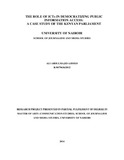| dc.description.abstract | This study sought to investigate the role of ICTs in democratizing public information access. It
was guided by four objectives: To determine digital options for capturing and recording
parliamentary proceedings; to assess the utilization of information communication technologies
in parliament; to find out the attitudes of MPs to digital media resources as well as their
perception to its use and value; and to establish the extent to which use of digital platforms by
parliament facilitate interactive public discussion. The study used a descriptive survey research
design. The target population of this study was all Members of Parliament and Parliamentary
Service Commission employees. There are 416 MPs and 532 employees of PSC according to
Parliamentary Service Commission Strategic Plan 2008 – 2018 that was revised in 2012. The
study sampled 10% of the MPs and Parliamentary Service Commission employees which
translated into 98 respondents. Quantitative data from structured questionnaires was analyzed
using descriptive statistics such as mean scores, frequencies and percentages. The results of
quantitative data analysis were presented in charts and tables. Qualitative data was analyzed
using content analysis. Results of qualitative data analysis were presented in prose or narrative
format. The study revealed that internet, email (for correspondence) and websites are used to a
moderate extent to gather information in parliament. The results indicate that websites and
internet were used to a moderate extent to store information in parliament. The findings show
that email (for correspondence), internet and websites were to a moderate extent used to
disseminate information in parliament. The results show that Parliamentary Service Commission
employees used email (for correspondence) often while Internet and websites were used to a
moderate extent. The results show that websites, email (for correspondence) and internet were
used in parliament for its daily operations. The results show that email (for correspondence),
ix
Internet and websites were received well to a moderate extent. Email (for correspondence),
Internet and websites were found to be embraced with speed by parliament to a moderate extent.
Internet, email (for correspondence) and websites were used to a moderate extent in interacting
with other arms of government. Internet and websites were found to be used to a moderate extent
by parliament to interact with the public. Web-based discussion forum, biometrics, podcasts and
blogs were not used at all by parliament to interact with the public. This study concluded that
only a few digital options have been used for capturing and recording parliamentary proceedings
and the few digital options have only been used to a moderate extent. The Parliamentary Service
Commission employees used email (for correspondence) often while Internet and websites were
used to a moderate extent in their day-to-day operations. The reception of new ICT by
Parliamentary Service Commission employees can also be termed as moderate or lukewarm.
Digital platforms used to facilitate interactive public discussion in parliament were rare. The fact
that Internet and websites were only used to a moderate extent by parliament to interact with the
public shows there is a digital gap in parliament that needs to be filled for interactive discussion
with the citizenry. This study recommends that parliament should embrace digital options
available for capturing and recording parliamentary proceedings. The government should ensure
that parliament has the requisite capacity to adopt various digital options. The Parliamentary
Service Commission should ensure that its employees are well trained to use all the available
digital platforms and especially those that enable interaction with the public. Parliament should
not over rely on the Kenya Broadcasting Corporation for its dissemination of information. | en_US |



